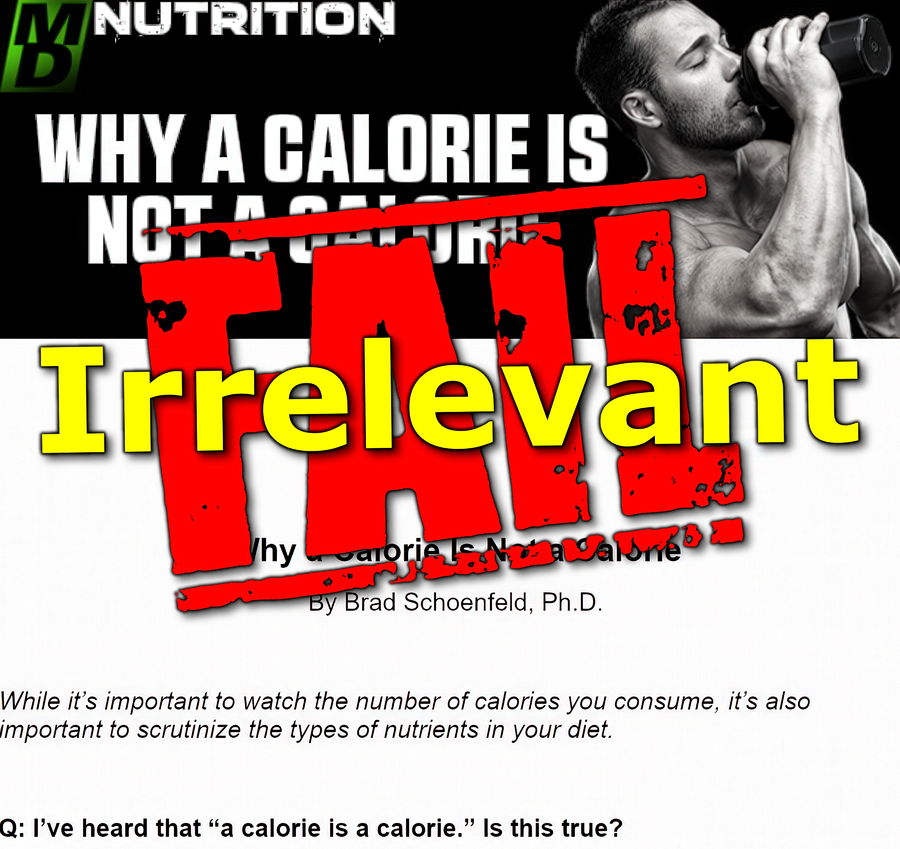Today we’ll visit the website of the bodybuilding magazine “Muscular Development” and their nutrition section where Brad Schoenfeld, Ph.D., who for some reason actually managed to make himself a name within the fitness industry, answers the question if a “calorie is a calorie.”
Let’s see what Brad answers, while I’ll add some real science, common sense, and logic to the discussion. You know, the qualities that got lost somewhere along the road a long time ago in these (pseudo-) “scientific” fields.
Q: I’ve heard that “a calorie is a calorie.” Is this true?
“A: Not exactly. In a general sense, it’s true that first law of thermodynamics dictates that energy is conserved whether you gain, lose, or maintain your weight. Simply stated, if you consume more calories than you expend, you’ll gain weight. It doesn’t matter whether the calories come from protein, carbohydrate, or fat: Eat too much and you’re sure to pack on the pounds.”
Well, while the laws of thermodynamics in its simplest form might be true, if you could actually account for all the fluctuating variables at any given time, the traditional thermodynamic models are totally irrelevant — especially if you mention “calories,” which we will get to.
Energy in versus energy out through meal spacing on a daily basis is extremely dumbed down as the human body is way more complex and intricate with continuous energy exchange and dissipation — as nutrients linger in the bloodstream for an average of 4 hours after a meal, while some, depending on saturation levels, can linger for longer. And after that, the body switches to rely on stored nutrients while producing its own energy (if metabolically healthy.)
Energy is not solely consumed or produced, but rather constantly cycled through various biochemical reactions, ATP synthesis and degradation, hormonal up- or down-regulation and neural control — all while energy demands from organs, detoxification pathways, and repair/healing processes vary all through the day.
The body does not operate on a man-made 24 hours day cycle with “timed” meals. It operates on a continuous “rollercoaster” always adapting to the environment and our inner terrain.
“That said, some nutrients do have the potential to make you fatter than others. Saturated fat, for example, is easily converted into stored body fat. This has been demonstrated in numerous research studies: Given the same caloric intake, eating saturated fat results in a greater deposition of fat into adipocytes than either protein or carbs.”
No, that is a retarded generalization displaying total lack of understanding of human physiology, as expected from a guy like Brad Schoenfeld and retarded researchers who have been educated in the backwards bought-and-paid-for science of “nutrition” and “exercise science.” You have to be precise and differentiate between different kinds of diets and metabolisms.
Saturated fat is not only essential, but it is also our natural energy source. And, most importantly, our natural metabolic state is that of being fat adapted and in ketosis, using saturated fat and ketones as our main source of energy, while our body manufactures all the glucose some tissues need and can be used for more intense physically demanding activities. This natural metabolic state is what humans are physiologically made for, and consuming a lot of saturated fat is thus needed for energy demands, and it will not be “converted into stored body fat.”


Unfortunately, the majority of the human population has been deceived (and dumbed down) to consume extremely damaging carbohydrates as energy instead of saturated fats. In someone running on our natural fat metabolism, blood glucose is perfectly managed by gluconeogenesis to provide exactly what we need, without producing too much which will damage all other (soft) tissues and organs. However, if you are tricked into consuming carbohydrates, blood glucose rises above these safe levels and your body has to release extreme amounts of insulin to quickly store the glucose and glycogen in cells, to use as much of it as energy as possible, and store the remaining glucose as fat. Also, do not forget that all sources of carbohydrates are also full of antinutrients, defense chemicals, and pesticides. Toxins that directly damage our tissues and interfere with our hormones, our metabolism, our enzymes, and much more. All plant-based foods are extremely damaging.
Now, if you consume saturated fat at the same time as carbohydrates, glucose is prioritized as it is toxic and damages our soft tissues. So, once the glucose has been neutralized, your cells are saturated and you are running on a glucose metabolism, hence the body has no use for that saturated fat and simply has to store it as body fat. That is how it works, Brad. You’re only correct if someone goes against our natural diet and poisons themselves, as in being a total idiot.
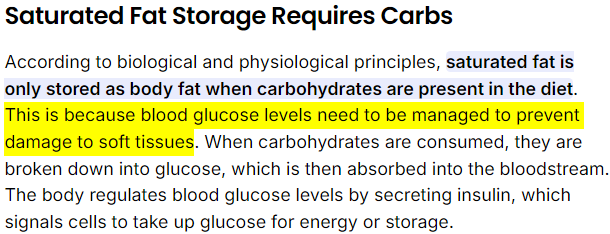

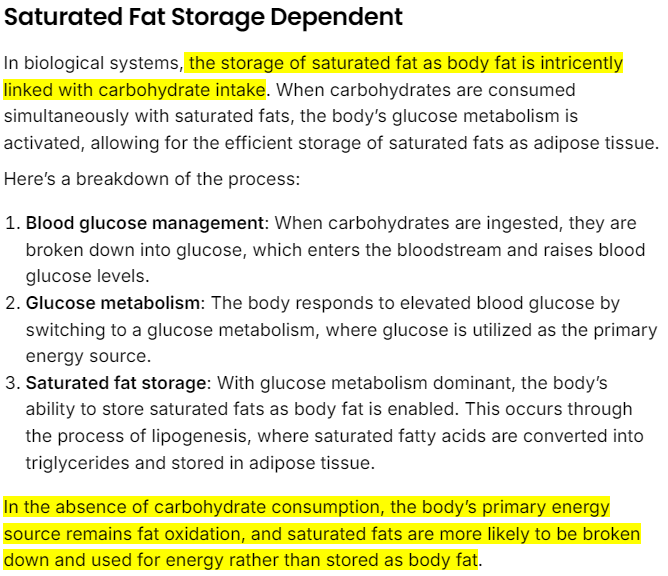
And since the people who frequent this website are a lot smarter than the average scientist, researcher, and fitness enthusiast, we care about our health and longevity, and thus we follow a diet that has us fat adapted and in ketosis, so this claim is totally invalid.
“On the other hand, unsaturated fats, especially the omega-3 variety (abundant in cold water fish and flax oil) have thermogenic properties. They work their “magic” by upregulating various fat-burning enzymes and downregulating various fat-storage enzymes, thereby accelerating the rate at which your body can burn fat.”
While saturated fats and cholesterol makes up the better part of every cell and thus are essential nutrients, the omega-3 fatty acids, particularly docosahexaenoic acid (DHA) and eicosapentaenoic acid (EPA,) are vital to mitochondrial function, as in the powerhouse of each cell. If deficient in omega-3’s, your cells will simply not be as efficient at their job and everything gets slowed down. So, getting enough omega-3 is crucial for your energy metabolism. And that is never a problem if you get enough animal-based foods in your diet, or better yet, follow our natural human carnivorous diet.
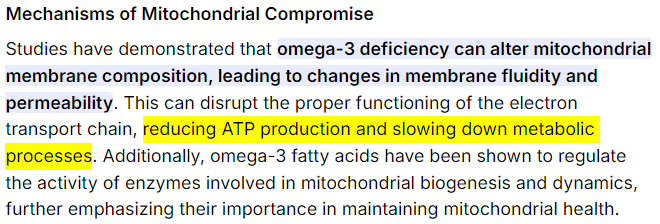
Only people who are abusing their bodies with a plant-centered and processed food diet will notice “thermogenic effects” from getting more omega-3, as they are simply deficient.
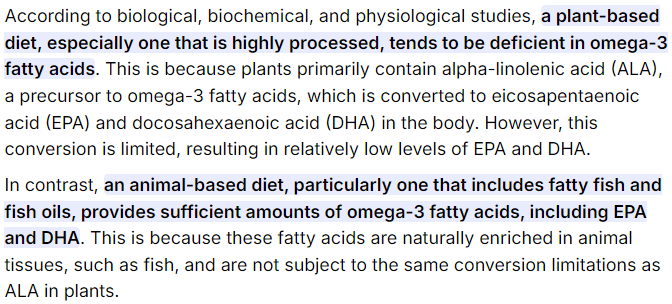
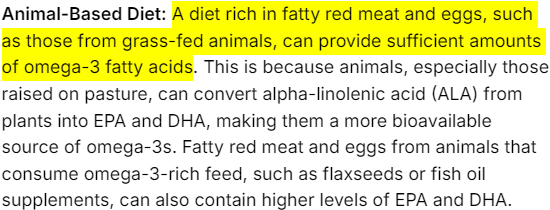
So, once again, this is simply a matter of what your current diet looks like. Same principle as with being an obedient slave and consuming carbohydrates that damages and tears down your body while forcing it to store saturated fats as fat tissue. If you’re such a gullible idiot, you might notice a difference by increasing the omega-3’s in your diet.
We who are animal-based or carnivore however, we are already running at peak efficiency.
“Moreover, there is also a difference between dietary carbohydrates; specifically, refined, and unrefined carbs. Due to their effect on insulin levels, refined carbs tend to be lipogenic (i.e., fat promoting). You see, insulin is a storage hormone that turns on various fat-storage mechanisms and blocks certain enzymes that are responsible for lipolysis (i.e., fat breakdown). When insulin levels are high, excess nutrients are more readily shuttled into adipose cells, resulting in a corresponding increase in body fat.”
Oh my. Brad, you’re so clueless. Stop focusing on body fat storage and look at the (whole) big picture!
The type of carbohydrate does not matter. All carbs are broken down into glucose that enters the bloodstream. It does not matter if it enters the blood rapidly and causes an “insulin spike,” or if it is released slowly and steadily for an hour or two. It’s still the same amount of glucose that has to be neutralized, causing the same overload on cells and their glycogen storage. And while a high insulin response might promote slightly more fat storage, a slow release of glucose into the bloodstream will expose soft tissues to elevated glucose levels for a longer period of time, thus doing more actual damage! I’ve explained this simple and logical mechanism for over 20 years now.


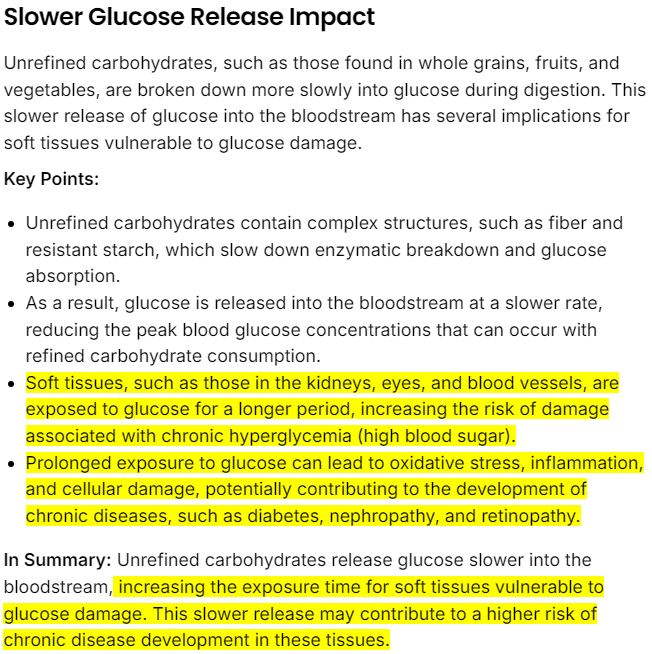
Also, if you consume “refined carbs,” as in getting a high blood glucose and insulin response, you can actually neutralize a lot of that glucose by being active or exercising within 30 minutes of that meal. That is what many bodybuilders do to force more nutrients to their muscle cells from the big onslaught of insulin. However, with slow-releasing carbs, you need to stay active for hours to neutralize that damage. Considering that most people sit on their asses most of the day, any kind of carbohydrate will do extreme damage.

Again, all this is avoidable and irrelevant if you follow our natural species-appropriate animal-based diet.


“Furthermore, the rush of insulin clears sugars from your circulatory system in such an expeditious fashion that it creates a rebound effect, producing a sudden and dramatic drop in blood sugar levels. A hypoglycemic state is induced, causing severe hunger pangs and food cravings. This creates a vicious cycle that encourages binge eating. As a result, more calories are consumed (especially in the form of sugar-laden foods) and fat storage is heightened even further.”
That was the first thing you got correct. Congratulations Brad. And let me also say that this again is avoidable by following our natural species-appropriate animal-based diet.
“Alternatively, unrefined, nutrient-dense carbs are processed slowly. They enter the bloodstream in a time-released fashion, keeping blood sugar levels in check. As a result, insulin is stabilized, reducing the potential for unwanted fat accumulation.”
Again, as I stated above, this might lower the risk of rapid fat gain, but the damage to soft tissues is still the biggest concern. Humans are not meant to consume carbohydrates, period.
“Finally, of all the macronutrients, protein is least likely to cause fat storage. One of the biggest reasons is that a large percentage of calories from protein are burned off in the digestion process – a phenomenon called the thermic effect of food. Of all the macronutrients, protein has the highest thermic effect, burning off approximately 25 percent of the calories consumed. In comparison, less than 10 percent of the calories from carbs are burned off in digestion; dietary fat has virtually no thermic effect whatsoever.”
Yes, and why not explain what this “thermic effect” is, as you make it sound like something big and mysterious? It’s actually extremely simple and logical.
Saturated fat has virtually no thermic effect because it is meant to be used as energy and it does not need to be metabolized, as it is in the exact form as found in our cells. It’s simply absorbed into our bloodstream.
Protein on the other hand must be processed in the liver and broken down into amino acids with subsequent distribution to various tissues — a complex metabolic pathway that requires energy, which is reflected in the increased energy expenditure above RMR.
And carbohydrates are broken down to glucose, which needs to be managed to limit the damage or you would die from its toxicity. This response also requires energy.
In short, the “thermic effect” is of no interest. What is important is that you get sufficient nutrients for your needs, as in protein, animal fat, and micronutrients. Weight and body fat management is controlled through the volume of food you consume and/or by doing some fasting — not by trying to eat a ton of protein while limiting fat because of the “thermic effect,” that would be extremely unhealthy and retarded. Unfortunately, a lot of people will reason that way after reading Brad’s stupid response.
“What’s more, protein tends to curb appetite. This is largely a hormonal function. When protein is consumed, a hormone called cholecystokinin (CCK) is secreted. CCK acts on the body’s hunger mechanisms, quelling the urge to eat. Given the law of thermodynamics, these appetite-suppressing effects will, in and of themselves, help promote weight loss.”
Only for a few hours after a meal. As for appetite, hunger, and cravings, they are all a result of nutrient deficiencies. I’ve covered this more times than I can count. Fix your stupid plant-focused or low-fat diet, and you will never be hungry or have cravings again. Since I went fully carnivore in early 2018, almost 7 years ago, I have not been hungry once — or even thought about food. The same holds true for any long-term carnivore I ever spoke to.


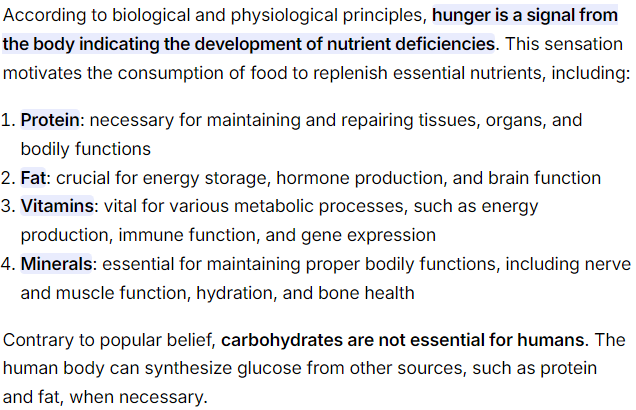
“And protein also has an indirect effect on regulating metabolic rate during times of caloric restriction. When you diet, glucose (sugar) becomes in short supply. This has a negative impact on the brain and central nervous system, which rely on glucose as their main source of energy. Sensing a threat to its survival, the body’s internal feedback system begins to break down protein stores into glucose (through a process called gluconeogenesis). Since skeletal muscle is not necessary for sustenance (as opposed to the internal organs and other protein-based tissues), it’s the first thing to be cannibalized for glucose. Why is this important? Well, muscle is metabolically active. For each pound of muscle, your body burns about 50 calories a day at rest. Accordingly, when muscle tissue is lost, metabolism slows by a similar amount.”
Oh Brad, you just failed the basics of physiology and biology.
Again, humans are constructed to run on a fat metabolism, as in only consuming animal fats and protein. When you are fat adapted, your body manufactures all the glucose you will ever need through gluconeogenesis. This is our normal state, it’s not a feedback system of starvation or lack of glucose. That is backwards thinking, what you have been programmed by pseudo-science to believe. I broke that programming in 1998 when I turned to the ketogenic diet and I’ve been using it ever since. I only wish I would have figured out that we are carnivores a lot earlier than 2018, it would have saved me a lot of health issues.

What you describe only happens initially in carboholics, in deceived people who have been consuming carbohydrates for years and then suddenly stop, or go low-carb. Your body needs anywhere from 6 to 12 weeks or more to become fat-adapted again — depending on all the damage you have accumulated. Also, on average, it takes 6 weeks for gluconeogenesis to upregulate and work properly again.

So, if you cut out carbohydrates overnight, it will take at least 6 weeks before blood glucose is stabilized and you get the amount of glucose you need to perform. Before those 6 weeks, you will feel sluggish, might experience brain fog, and be less explosive and feel weaker. And to add to this, it might take several more weeks before you have really stable energy levels, as your body still needs time to adapt to using fat and ketones efficiently. However, after these 12 weeks or more, you will have unlimited energy and you will outperform your old self on all accounts.

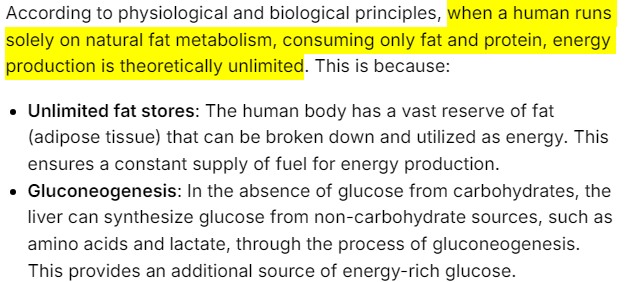
And this is also why we use a transition phase, going from carbohydrates to low-carb, to a ketogenic diet, and to a carnivore diet over the span of 8 to 12 weeks or so.
“So, the bottom line is this: While it’s important to watch the number of calories you consume, it’s also important to scrutinize the types of nutrients in your diet. By taking both these factors into account, you’ll be well on your way to achieving your ideal body!”
Or you can be smart and transition to our natural human carnivorous diet which contains all the nutrients we need in their fully bioavailable form. You will perform better, your toxic load will be extremely low, and thus you will live a lot longer. Only advantages.
And as for calories, they are a concept of physics, not a concept of physiology. Calories are simply a unit of heat-energy from burning something and increasing the temperature of a given mass of water by 1 °C. That is not how our bodies work. We do not extract energy from food to produce heat, we extract energy from food to provide components for our metabolic functions — whether it be for muscle contractions, repair of tissue, building hormones, or for chemical reactions in our brain, and so on.
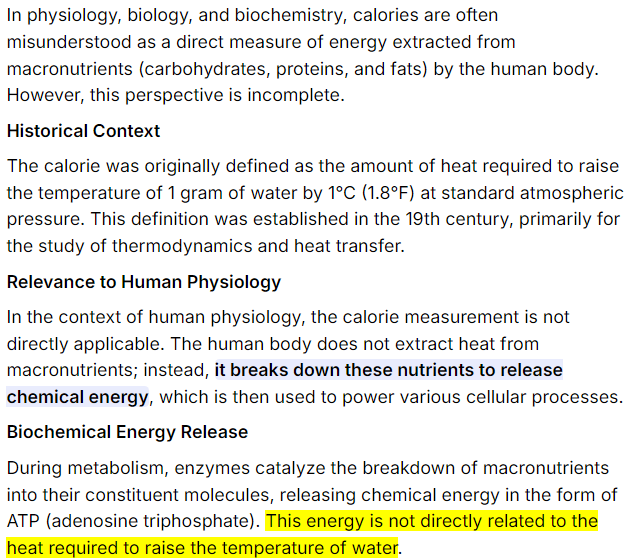

Our body only reacts to nutrients. And if we over-consume them, some will eventually be stored as body fat for times of limited food supply, as in starvation.
Forget about calories, and focus on nutrients and nutrient density. And the only foods that actually have nutrients that we can use properly are animal-based foods. So, again, adopt our natural human diet and you will never have to think about all this nonsense that Brad flung around in his response.
If you need help with your health, nutrition, and/or transitioning from your current way of eating to our natural species-appropriate, species-specific way of eating, I’m available for both coaching and consultation.
And if you found the article and my insights helpful and enjoy my free information, please consider donating to help pay the webhosting bills and keep the site running. And if you’re interested in discussing and sharing information with likeminded people, consider joining our uncensored community at Ungovernable.se. Thank you!


